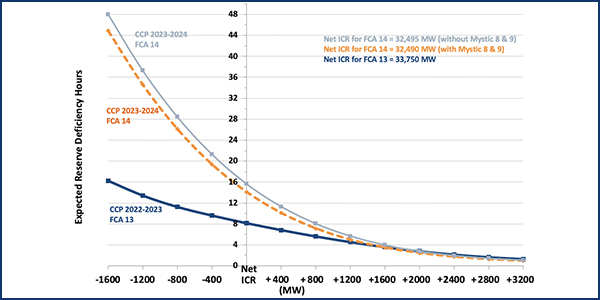The New England Power Pool Reliability Committee last week voted to recommend that ISO-NE approve pool-supported pool transmission facility (PTF) costs totaling more than $39 million for three projects by Eversource Energy.
The first project involves $24 million in PTF costs for work associated with the rebuild of the 69-kV 667 line in Connecticut, with none of the costs associated with the upgrade considered localized.
The work would replace 52 wood structures with steel pole structures to mitigate deficiencies such as woodpecker damage, rot, cracks and deteriorated steel mechanical connections, Eversource engineer Bob Case said.
Based on a show of hands, all three motions passed with none opposed and no abstentions. All sectors had a quorum except End Users.
The second project has PTF costs of approximately $7 million for work associated with the 115-kV 1180 line cable replacement between Norwalk Harbor and Ely Avenue Junction.
The project will replace nearly a mile of 2,000-kcmil HPFF cable with 2,500-kcmil cable to mitigate continuous increases in dissolved gas analysis levels, which potentially result in reliability concerns as well as safety and environmental risks.
The third project has PTF costs of nearly $8.2 million for similar work associated with the 115-kV 1608 line cable replacement between Norwalk Harbor and Ely Ave, replacing 8,500 feet of 2,000-kcmil cable.
Capacity Cost Compensation
The RC also voted to recommend that ISO-NE approve West Medway Jet 4 and Jet 5 as dynamic reactive resources meeting the Capacity Cost Compensation Program eligibility requirements defined in Tariff Schedule 2.
The approval calls for the Schedule 2 business procedure compliance costs to be designated as eligible for Schedule 2 capacity cost compensation associated with the qualified reactive resource designation, to be effective Nov. 1, 2019.
Providing adequate reactive supply and voltage control service (VAR service) from reactive resources, as defined in the Tariff, is necessary to maintain reliable voltage levels on the New England transmission system. Schedule 2 defines the extent to which reactive resources are compensated for providing VAR service and transmission customers are charged for utilizing the service.
Operating Procedure Revisions
The RC voted to recommend that the Participants Committee support revision of ISO-NE Operating Procedure No. 2 to incorporate a new reference document and clarify the RTO’s role in approving the scheduling of planned equipment maintenance and outages.
ISO-NE lead operations analyst Kory Haag presented for a future vote the initial proposal for revisions to Operating Procedure 11E related to black start resource administration and a designated black start resource (DBR) test log.
The proposed revisions clarify recording the amount of time the DBR is in stable operation to be consistent with Northeast Power Coordinating Council Directory 8 covering system restoration and incorporate minor grammatical fixes.
Proposed Plan Applications
The committee voted to recommend that ISO-NE approve NextEra Energy Resources’ 150-MW Lone Pine Solar facility in Maine and related transmission projects.
NextEra will install a station transformer, while Central Maine Power plans to build a new three-breaker 345-kV ring bus configured substation to accommodate interconnection of the project to the existing Section 391 line between the Buxton and Scobie Pond substations. The proposed in-service date of the project is Dec. 31, 2022.
The RC also approved a power purchase agreement by New England Power for a static synchronous series compensator at the Fitch Road substation in Clinton, Mass., with a proposed in-service date in March 2020. The compensator is a modular power flow control device to inject a leading or lagging voltage in quadrature with the line current, providing the functionality of a series capacitor or a series reactor, respectively, on the 69-kV W-23 circuit.
The RC recommended that ISO-NE approve implementation of Freepoint Solar’s 20-MW solar array in Peterborough, N.H., to interconnect with a line tap on the Eversource 34.5-kV Line 313 between South Peterborough and the Monadnock substation. It also approved Freepoint’s 20-MW solar array in Thornton, N.H., to interconnect with a line tap on the Eversource 34.5-kV Line 342B north of the Beebe River substation. Both projects would have a December 2022 in-service date.
The RC in one vote approved implementation of 58 individual PPAs by New England Power, known as the Western Massachusetts Distributed Energy Resource Additions Cluster (Group 1) Generation and Transmission Project. Based on a show of hands, the motion passed with none opposed and three abstentions, all from the Publicly Owned Entity sector.
Estimated Operating Reserve Deficiency
Fei Zeng, ISO-NE’s lead analyst for resource studies and assessments, reviewed the estimated hours of system operating reserve deficiency for Forward Capacity Auction 14 (2023/24) calculated with and without Mystic 8 and 9.
Zeng said the analysis can be considered an extension of the installed capacity reserve (ICR) calculation and uses the same model and underlying assumptions. The analysis simulated all the hours of year and only found reserve deficiency hours during the summer months without the Mystic units.
The estimated annual hours of operating reserve deficiency for capacity commitment period 2023/24 (FCA 14) are higher than 2022/23 (FCA 13).
The probability of deficiencies occurring is lower for the extreme high load levels (high exposure to load-shedding conditions) in the FCA 14 forecast than in FCA 13, resulting in fewer loss-of-load events and a reduction to ICR. However, the probability of operating reserve deficiencies occurring is higher for the intermediate high load levels (high exposure to reserve shortage conditions) in the FCA 14 forecast, resulting in more reserve deficiency hours, Zeng said.
The RC will consider the issue again in December, he said.
— Michael Kuser




